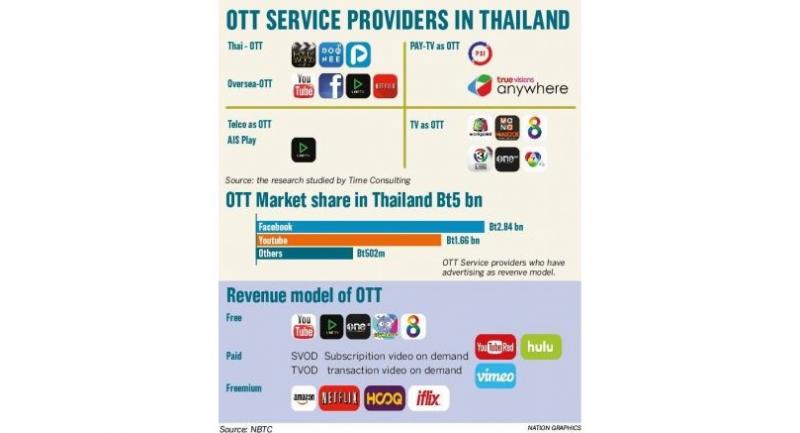OTT regulatory model expected by September

THE NATIONAL Broadcasting and Telecommunications Commission is expected to roll out its model for regulating over-the-top (OTT) content providers by September.
The term OTT refers to audio, video and other content transmitted via the Internet. Natee Sukonrat, chairman of the NBTC’s broadcasting committee, said a subcommittee had been set up on Monday to study OTT-related business.
The main task of this subcommittee during the initial stage is to find a model for regulating such businesses.
He said regulation was needed to protect the consumer and ensure fairness for all players in the broadcasting industry.
Research by Time Consulting has detailed the OTT regulation models used by other countries.
In the United Kingdom, the Office of Communications (Ofcom) regulates OTT licensing, content and consumer protection while the Advertising Standards Authority regulates advertising on such platforms. The Korea Communications Commission and the Ministry of Science, ICT and Future Planning regulate OTT business in South Korea under the Internet Multimedia Broadcasting Business Act of 2013.
Singapore’s Infocomm Media Development Authority regulates OTT business in the city-state. Such businesses are considered Internet content providers that need to comply with the Internet Code of Practice.
Some of the things these regulators are concerned with are protecting children from certain material and enforcing local-content quotas.
Natee said the NBTC would consider regulation to keep inappropriate content from being broadcast by OTT services. The subcommittee would consider mechanisms on such matters as licensing, registration, taxation and so on.
“Within four to five months we will have solid details about this,” he said.
He said the three pending NBTC bills – the Telecom Business Act, the Broadcasting Business Act and the Frequencies and Allocation Act – would likely be able to accommodate regulation of OTT business.
The Time Consulting study found that the overall value of digital advertising in Thailand, excluding Facebook, was Bt1.599 billion in 2015 and Bt2.165 billion in 2016, and is expected to increase to Bt4.502 billion by 2020.
The study found that according to the Digital Advertising Association of Thailand, Facebook is the biggest player in the video-on-demand business, followed by YouTube.
According to the research study about OTT developed by Time Consulting, there are three types of business in this category.
They are free services such as Facebook, YouTube and Line; paid services such as YouTube Red, Vimeo and Hulu Plus; and “freemium” services such as Netflix, iflix, HOOQ and Amazon Prime.
There are many kinds of OTT services offered in Thailand, including by global service providers such as YouTube, Facebook and Line. Some TV channels also offer OTT services by broadcasting their |content on OTT networks. Telecommunication players also offer OTT services such as AIS Play.
“We will ensure that the regulation will benefit both the public interest and the industry,” Natee said.
Artima Suraphongchai, head of marketing at iflix Thailand, said the firm would agree to government regulation of OTT business if the rules were fair to everyone, whether Thai, regional or global players.
She also urged the government to target illegal content service providers offering pirated programmes as OTT business.
Meanwhile, Netflix said it could not comment, as it is waiting for clarity on what aspects of OTT business the government would regulate OTT business.





